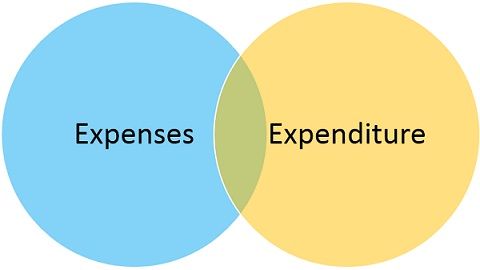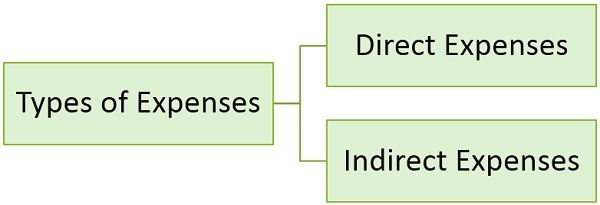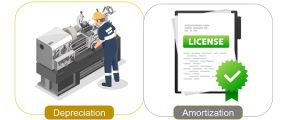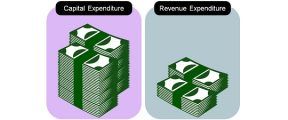 The words ‘expenses’ and ‘expenditure’ are commonly used as synonyms, but there is a fine line of differences between them. While expense refers to the amount spent on the production or selling of the goods and services, so as to generate revenue, expenditure implies any type of disbursement of funds made by the enterprise.
The words ‘expenses’ and ‘expenditure’ are commonly used as synonyms, but there is a fine line of differences between them. While expense refers to the amount spent on the production or selling of the goods and services, so as to generate revenue, expenditure implies any type of disbursement of funds made by the enterprise.
While expense denotes consumption of cost, expenditure indicates outlay of funds. It is worth noting that expenditure is a broad term that covers expenses. Further, the portion of expenditure that is deemed to have been utilized in the current is regarded as the expense for that year.
This written account will cover all the points that differentiate an expense from an expenditure.
Content: Expenses Vs Expenditure
Comparison Chart
| Basis for Comparison | Expenses | Expenditure |
|---|---|---|
| Meaning | Expenses refer to the voluntary incurrence of cost for the use of assets, to generate revenue. | Expenditure refers to the amount spent on the acquisition of an asset or service by the enterprise. |
| Term | Short term | Long term |
| Frequency | High | Comparatively less |
| Appears in | Income Statement | Position Statement |
| Related to | Only one accounting year. | More than one accounting year. |
| Objective | To generate revenue | To increase the profit earning capacity |
| Recognized when | Related sale is recognized or when the asset in question has been utilized. | Cash is paid out or liability is incurred. |
Definition of Expense
An expense is a cost which a business incurs, so as to earn revenue while undertaking business operations. Basically, it refers to the cost of assets consumed or services used, by the firm during the course of the financial year.
It is that portion of expenditure that is written off in a financial year. Fixed assets such as plant and machinery, furniture, vehicles, etc. are completely utilized during their lifetime, and their life years are definite say 5 years or 10 years. So, the proportion of fixed assets which is expired during the period, while carrying out business operations, such cost is allocated to the expenses.
In other words, expenses are the costs, whose benefits have been completely used up during the period.
To generate income, a firm has to use some of its resources to produce goods and services and offer them for sale. The amount spent by the firm in purchasing or arranging these resources is termed as ‘expense’.
Types of Expenses
Expenses are mainly classified into two categories: Direct Expenses and Indirect Expenses

- Direct Expenses: Expenses that are associated with the production of goods or rendering of services, such that they can be directly recognized with the concerned cost object are direct expenses.
- Indirect Expenses: Those expenses which are incurred during the course of regular business operations and cannot be directly identifiable to the concerned cost object are indirect expenses.
Examples of Expense
It includes salaries, rent, commission, utility bills, transportation costs, fuel and gas, payment of interest, repairs, etc.
Definition of Expenditure
Expenditure refers to the total amount of resources used up by the firm, such as the amount spent or cost incurred for acquiring assets or services. The amount is either paid in cash or credit, or the assets are exchanged for other assets.
It does not merely mean an outflow of cash from the business, but it may also result in outflow or depletion of assets, transfer of property, and increase in the firm’s liabilities. It is measured by cost, which can be expired or unexpired.
- Expired Cost (expense): It represents that part of the expenditure which has been exhausted during the financial year. It can be further sub-divided into:
- Utilized Cost: It represents that portion of the expired cost which helps in the generation of revenue, as well as it takes into account the cost of goods sold and services rendered.
- Lost Cost: It covers that portion of the expired cost that does not participate in the generation of revenue and thus deemed as a loss.
- Unexpired Cost (asset): It represents that portion of the expenditure which has not yet been consumed, till the end of the accounting period. It is treated as an asset because it does not reduce equity.
Note: There is a difference between expenses and expenditure. However, all expenditures are written off as an expense, over the years, as the part of the expenditure which expires during the course of the financial year is termed as an expense.
Types of Expenditure
There are three types of expenditure:
- Capital Expenditure: Expenditure incurred in connection to the acquisition of fixed assets, resulting in the increase in earning capacity of the firm and its benefit lasts for more than one accounting period. Capital expenditures are charged to the income statement, as well as they are dispersed over more than one period. Example: Purchase of land and building, purchase of machinery, etc.
- Revenue Expenditure: Expenditure incurred in the normal course of business or to maintain the earning capacity of the firm is regarded as revenue expenditure and the benefit of such expenditure extends up to one year only. These expenses are treated as expenses for the current period, and thus appear in the firm’s income statement. Example: Depreciation on fixed assets, salaries, etc.
- Deferred Revenue Expenditure: Expenditure which is presumed to give benefit for several years, is deferred revenue expenditure. As a huge amount is spent, so rather than charging the entire amount in a single year, the amount is divided and written off over the years. Example: Advertisement expenses, preliminary expenses, etc.
Also Read: Difference Between Capital Expenditure and Revenue Expenditure
Key Differences Between Expense and Expenditure
So far we have understood the concept and types of the two terms. Come let us understand the difference between expense and expenditure:
- The term ‘expense’ can be defined as the money spent on the cost of goods and services consumed while undertaking commercial activities to earn revenue. As against, expenditure implies the cost incurred for buying assets for the firm, in the form of outlay or depletion of assets or incurrence of liability.
- Expenses are incurred to meet the short-term needs of the business, whereas expenditure is incurred to meet long term needs of the concern.
- Expenses are recurring in nature, as they are incurred daily, weekly or monthly, and so the frequency is high. Conversely, the frequency of incurrence of expenditure is comparatively less.
- Expenses appear on the company’s income statement, whereas expenditure appears on the company’s position statement, i.e. balance sheet, either as a reduction in cash or an increase in liability for the acquisition of the asset.
- An expense is a cost associated with the firm’s operations during the financial year or with the revenue generated during the financial year. And the benefits of such expense are limited to one accounting period only. On the other hand, the amount spent as an expenditure tends to provide benefits that stretch over more than one accounting year.
- While expenses are incurred in connection to the business operation so as to generate revenue, expenditure is incurred to increase the profit earning capacity of the concern.
- As per the matching concept, an expense is recognized in the income statement for the period in which the cost matches the sales or the portion of an asset that has expired or used up. On the contrary, expenditure is recognized when there is the disbursement of funds or an increase in liability.
Example
Suppose a plant is acquired for Rs. 35,00,000 on which depreciation is charged @ 10%. The amount spent on its acquisition is an expenditure, or more precisely, capital expenditure whereas the depreciation charged is an expense for the financial year.
Conclusion
In a nutshell, the amount spent with the purpose of obtaining benefit is an expenditure and the part of the expenditure that is used up during the financial year is an expense.






Tamene Tolera says
Its good
Vivian Worlanyo-Deh says
Very helpful write up